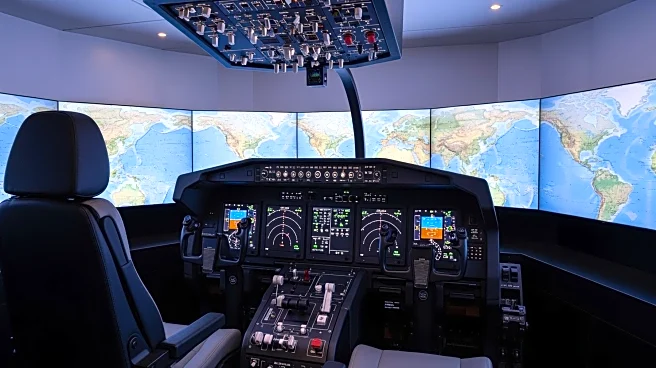What's Happening?
American Airlines is actively preparing its pilots to operate the Airbus A321XLR aircraft on transatlantic routes starting next year. The airline has conducted a series of training flights across the North Atlantic using A321neo aircraft to qualify pilots for
the upcoming long-range service. Despite having technically received its first A321XLR from Airbus, American Airlines has delayed its deployment due to ongoing seat supply chain challenges. The airline anticipates integrating the A321XLR into its fleet by the end of 2025, initially serving domestic routes such as Los Angeles to New York John F. Kennedy before expanding to international destinations. The training involved 42 flights between Philadelphia and Edinburgh, focusing on unique transatlantic procedures and air traffic control operations.
Why It's Important?
The introduction of the A321XLR aircraft represents a significant expansion opportunity for American Airlines, offering a range of up to 4,700 nautical miles. This capability allows the airline to explore new international routes and enhance its network connectivity. The training of pilots for transatlantic operations is crucial, as it involves adapting to different air traffic control environments and learning new procedures. Successfully integrating the A321XLR into American Airlines' fleet could strengthen its competitive position in the transatlantic market, potentially increasing passenger capacity and revenue. However, the delay due to supply chain issues highlights ongoing challenges in the aviation industry, affecting fleet expansion plans.
What's Next?
American Airlines plans to continue training its A320 fleet pilots, who are primarily experienced in domestic routes, to operate the A321XLR on transatlantic flights. The airline will soon announce the initial international destinations to be served by the A321XLR. As the training progresses, American Airlines aims to qualify more pilots and finalize operational procedures for the new aircraft. The Federal Aviation Administration (FAA) inspectors have been involved in the training flights, ensuring compliance with safety standards. The successful integration of the A321XLR into American Airlines' operations will depend on resolving supply chain challenges and completing pilot training.
Beyond the Headlines
The deployment of the A321XLR aircraft by American Airlines could have broader implications for the aviation industry, particularly in terms of long-range narrowbody aircraft utilization. This development may influence other airlines to consider similar fleet expansions, potentially reshaping transatlantic travel dynamics. Additionally, the focus on pilot training for unique transatlantic procedures underscores the importance of adapting to diverse operational environments, which could lead to advancements in pilot training methodologies and air traffic control systems.















